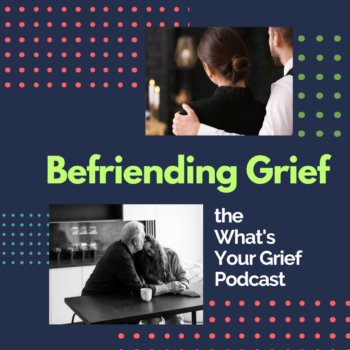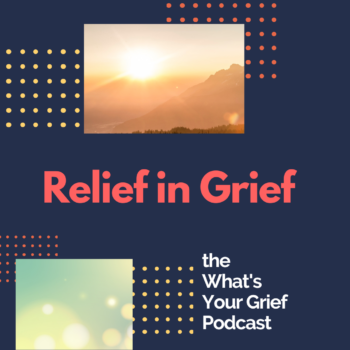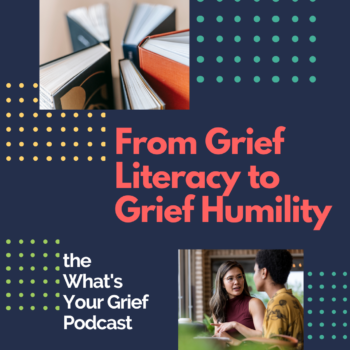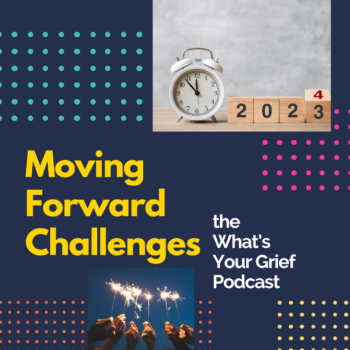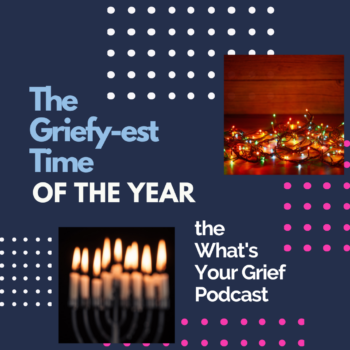The Grief of Anticipated-Sudden Deaths
/ What's Your Grief Podcast : Litsa Williams
The What's Your Grief Podcast: grief support for those who like to listen.

In this grief podcast, Eleanor Haley, MS and Litsa Williams, MA, LCSW-C, the mental health professionals behind the website and book 'What's Your Grief', leave no stone unturned in demystifying the complicated and messy world of living life after loss. One digestible topic at a time, Haley and Williams distill topics ranging from grief theory to coping. Grief is sad and confusing, but your grief support doesn't have to be. You can listen here by using the player above or listen and subscribe wherever you get your podcasts.
Below we have provided a transcript of the episode.
Hey, welcome to another episode of the What's Your Grief Podcast. I'm Elanor and as always I'm joined by Litsa. Litsa, how are you doing this morning?
I'm doing pretty well this morning. It has been a okay weekend. I had a nice weekend. I guess, and so, yeah. It's, yeah, not a bad Monday morning.
All right. uh Here in Baltimore where you are not currently, it is still quite snowy. Last week was ridiculous with the number of cancellation and early closures and so on and so forth. It was one of those weeks that just reminds you, you can never get too comfortable. Because something's gonna happen to throw you off.
It's winter. Yeah, no. I have to say I was not sad to be out of town for snow. I just, it's not, I, it's pretty for a minute and then I just want it to be gone. So I wasn't too heartbroken to miss it.
I know. I was thinking about that. I grew up in Syracuse where there was always snow. Like, consistently for months on end, so I should be less of a baby about it there being snow outside. But I've just gotten so accustomed to Maryland where there's some winters no snow at all. And if there is snow, it usually lasts like a day. So, I've just gotten so accustomed to life that way that when there's consistently snow I'm like, uh I don't know if I can leave the house. I mean, truly like, when there were a bunch of snow days I felt terrible because my four-year-old was like, Can we go play in the snow? I'm like, I don't have snow pants. I don't have snow, like we were literally amongst the like older, myself and my older two daughters passing around one pair of snow pants and one pair of boots. So, I don't buy that stuff.
Yeah. It's like a microcosm of it's of what happens on a community level too. Which is like, We just don't have enough snowplows and preparation and whatever, right. It's like you can only dedicate so much storage space and money and whatever to all of the resources that you need for snow, if you only get it once a year, maybe.
Exactly.
Yeah. It's like, I feel like what happens on the personal level is not too different than what happens on the city and county level and why the roads don't get cleared very quickly.
Right. Right. And I'm just not.
So, yeah. My lack of preparation is why it's sometimes hard. I'm not used to living in the snow anymore. I am watching True Detective: Night Country right now where it is, are you watching it too?
I just started it. Yes. Oh. I'm so excited you're watching it too.
Talk about it offline, but the fact like watching it, it's so cold. Like, you can just. The coldness and the darkness is like a character basically on the show. And it's like, I was thinking about it when I was going to bed last night, like how? How do people live like that? But they're prepared for it, you know. It's just the way of life they get used to it. It's different than when you're not.
So funny that you said that because when it, when the show starts and they sort of start, they show you a count like the third day of night, you know, because they are moving into this time of year where it is, there, it's always darkness. And I actually thought to myself, Oh, we're such babies. We're always complaining about like, daylight savings. And when it starts getting dark early and whatever and I'm like there are people who live in places where just genuinely there are times of year where there is little to no daylight. I cannot even imagine. So, I was having many of those thoughts about us on this podcast and just offline in other situations, complaining about the deep dark winter and being like, Whoa, we have nothing to complain about.
Indeed. We really don't. Like, the weather in Maryland, like, it gets cold sometimes. It's so mild here, like, I love about Maryland but it's funny to be such complainers because we are such babies. And like, anybody who comes to visit from, like, you know, where I grew up, they're like, What? Why would your school's close? Like, when I was growing up you were lucky if you got one snow day. Like, you could get feet of snow and they were like Get your butt to the bus stop you're going to school. So, I don't know how I've become such a wimp. But I have. Anyways, this has nothing to do with what we're going to talk about today. Actually, full disclosure, as we've mentioned on the podcast, now, when we do our recordings we invite our communities, our professional community and our Griever Hub community to listen in. We live stream and they're able to come and listen and share their thoughts in the chat. So full disclosure, we already recorded this podcast once with the community and they had so many great thoughts and feedback that we were able to share. But the audio was not so good and we were, we didn't quite talk about it exactly the way we wanted to in a way that felt very clear and concise. So, anyways, we had to go back to the drawing board, we're doing this just you and me. No live stream audience.
Right. This time around. Not because we didn't want a live audience but because we just didn't have time to then notify everybody that we were re-recording. No, we're immediately re-recording after the failed attempt.
So…
Funny, the audio was not good and then my headphones died. So now, the audio still probably won't be good, but you get what you get with the What's Your.
Right. Exactly. No, so, we are hopefully going to maybe do the topic a little bit more justice this time, even though part of the reason in addition to the sound quality that I think it didn't end up being as ideal last time was that I think so many people connect to this experience and in different ways that we allowed ourselves to be a little sidetracked by the many different aspects of sort of this unique type of loss. So I say that to say, like, it's almost, I don't know, it was almost like a good reason, I guess, that it ended up feeling a little bit disjointed.
So, basically Litsa, you wrote an article this week talking about, I guess, it's not, would you say type of loss or would you say an experience? In loss.
I would say it's an experience in loss. Yeah. And yes an experience in loss.
So, and it's something that you're calling paradoxical grief, and we'll explain why. And actually it's not, though we've seen mentions of it here and there kind of in our reading and in stuff of that nature, it's not actually an experience that's really parsed out a lot that we've seen. If you've seen it, let us know. But that we've seen, we've not really seen it parsed out a lot. But anecdotally, we've had the experience. And just talking and working with people who are grieving, we've heard from them about their experiences, so we know it's a thing. We know it's a thing, but it hasn't necessarily been like named and described and really, I mean there's not like research or anything like that. So, what we wanted to do is describe the experience if nothing else to really normalize it for people and just talk about it a little bit. And if people have experiences like I said, we'd love to hear from you about it. Because this is something that I think is a fairly common experience but it's not something that people are really often normalizing. And at the same time, I do feel like it's something that might cause somebody to say to themselves, Is this normal? So with that Litsa, would you mind describing what is what we're calling Paradoxical Grief.
Yeah. I mean, I think in this really basic way, it is just the experience of being both prepared for a loss and also blindsided by it at the same time. Kind of being able to experience grief that isn't necessarily easily categorized in the ways that people traditionally think about it as like, Oh, there's anticipated losses and then there's sudden losses. It's instead this other type of experience we have when it is a little bit of both of those things.
Yeah. So, just to echo what you said, I think a lot of times we hear people talk about anticipatory grief and loss. And we've written about this we we talk about it all the time. And this is a type of loss where maybe a person's terminally ill, for example. And you know that they don't have a good prognosis, so there's that anticipatory type of grief that you always hear people talking about. And then, you always hear people talking about sudden death and losses that are very unexpected. Often, we talk about these when we talk about traumatic grief and loss. And so, you hear people talk about that. But you don't always hear this overlap of that venn diagram, where something might be anticipated a little bit but also at the same time be something that we might categorize as more sudden.
Yeah. I think that's exactly it. I think that it is, I think it's those losses that leave people feeling unsure of their own grief experience and feeling like, Oh wait. I don't know in some ways if I'm I fully fall into either of those categories. Because it's both, and those unique aspects of both the anticipation and also the suddenness really shape the way that our grief looks and feels after these sorts of losses.
Yeah. And I would add also, not just after, but because there's the anticipated element, there's the experience before the loss actually happens that I, and I think that is one thing that makes it really unique and different. So I don't know. Maybe it would be helpful if we gave some examples of how this might happen or at least one example of how this might happen.
Absolutely. I think, you know, in the article I talked about, I've had three different losses that feel like they have fallen into this category for me, each in different ways. But the one where I probably felt it the most dramatically was when my sister's partner died of an overdose. And I had, in so many ways, been well aware of the severity of his addiction, of the real risk of overdose. And in so many ways I had been consumed by that. Like, there, I, was so much worry for me about his safety, my sister's safety, you know, all of that when they were using. And yet, when he actually died of an overdose, I felt so sort of shocked and blindsided by it. And it just felt almost like hadn't really anticipated it at all. It was, you know, an interesting experience where I, sort of theoretically, abstractly, knew how high the risk was and yet the reality was so different because I had been really hopeful for recovery and focused on trying to support him and my sister in their own efforts to get sober and stay sober.
Yeah. So in that scenario, it sounds to me, and I'm thinking about my own similar experiences. Like, there's the anticipation but it's more abstract. It feels less like something that's like steeped in fact. Maybe there's not that prognosis that you might have when somebody has cancer, for example. But you know that there's a higher risk of the person dying, so it feels more abstract. And it might be super seeded by the hope that there's, that won't happen. Maybe in this instance the hope that they will get into recovery and stop using substances. And, or the hope that there's something that maybe the family can do to intervene. Or somebody. So it seems like it's more of an abstract reality that you know is out there. But I think, maybe in a protective way, maybe in a way that you're focusing on other things, you keep it a little more abstract and don't necessarily process it. But it's still there. And you still have that anticipation. And I think, thinking personally you still think about, What if this happens? What if this phone call is a bad phone call? I have to leave my ringer on at night in case somebody calls me in the middle of the night. So in a way, it's not quite as abstract as you like to believe because you are engaging with it in that way. Does that make sense?
Yeah, no. I think that's exactly it. And I think that you, you know, you have a guilt for that anticipation in some way as well. Which, again makes it a little different than certain other types of anticipatory grief, where, you know, say somebody has been transferred to hospice, it's often because you know collectively, that individual, and their family has come to understand that that person is going to die. That hope for survival is no longer there. And so, there's that shift where the hope now becomes, Let's keep this person comfortable. Let's make this time meaningful. And that's where we can shift. But in these types of losses, the hope that exists is still hope for recovery. Hope for survival. Hope that the person is going to keep living and being okay. And so, when those anticipation feelings come up, when it is like, that awareness that they really are, that they really might die, it almost feels like it's a betrayal of hope.
Yeah.
Or a violation. So I think that there's a lot of guilt that can come with that. That's part of what makes this experience really, sometimes complicated and hard is that we're judging ourselves about the different feelings that we're having.
I could see, in this particular instance especially, the guilt in the moment, you know. Like, it's a violation of hope to think anything otherwise. Maybe it's a lack of faith in the person. Maybe that person is saying you're being ridiculous, I'm going to be fine. So you're having somebody tell you, like, You're being silly, even though you may know deep down you're not being silly at all. And you know the realities. But, I think there's a lot of reasons why we might want to minimize or undermine that anticipation in the moment. And then afterwards, we're looking at the situation in hindsight and I think then we may have the guilt that we didn't take the time that we had with them, to maybe say the things we wanted to say or to have meaningful moments. We were so focused on other things, the stress of the relationship, of the situation, of wishing for them to get better that we didn't utilize that time. And then there's that guilt. Because, Hey, you know what, we did know. We didn't want to acknowledge it at the time but we did see the signs. We did anticipate this. And even though we anticipated it, we didn't do anything differently. So, I think that there's all that guilt that can come up in a situation like the one that we're describing now.
For sure. Yeah. I think that's so true. And I think that there are, in other situations where I can think of it where families have described this to us, sometimes people will even say, I articulated that anticipation or that worry that I was having to someone else in the family and they were like, Don't say that. We're, you know, we're all just praying. We're focused. We're, you know, sort of saying, Oh wait, you even labeling what you're feeling is that's not allowed here, right. Because we're in hope space. We're in survival-recovery space. And so, it just, it shuts it down sometimes, in a way where even maybe if you wanted to allow yourself to feel it and process it, sometimes you say it to the people around you and they're not in a place. And so, then you feel like, Oh wow. Was I wrong for feeling this. I certainly now feel like I can't articulate it to other people or it's not welcome within the family. So, we see a lot of ways that I think this can be, yeah, tricky.
I think, another one that feels a little different in the sense that there's probably just some different experiences within it, it makes me think of my grandmother who lived to a very old age and was living on her own, totally independent going to exercise classes. And so, you know, she was old and so we knew that she was at a higher vulnerability of something happening. But at the same time, like, we're like, But no, she's going to be okay. You know. And it was one of those situations where you just always felt like you were going to have another day, another day, another day. So I think, the situation when somebody's much older and you know but at the same time you don't know, I think that's, that makes me, I think that falls in here as well. Like, there's the anticipation. But you don't want to believe it cuz they're fine and they're, you know, up doing their normal thing. And so, you don't always really focus on that anticipation. And then when they die it's very sudden. But then, what everybody around you is saying, Well they were 94, how did you not know? And you're like, Well, I knew. But I didn't really know, you know. Right. Like, it's a lot more sudden because I wasn't anticipating this to happen today, you know.
Absolutely. So there's that exactly what you described. There's that like, Well, how did you not take advantage of every minute of the time. You should have known because she was 94, you know, or you're saying that to yourself. And also, on the other side you can see that if you, yourself were maybe like, Oh. I've got to, you know, savor every moment and do all these things and I'm mentioning it to my family that, then other people or you to yourself are like, But she's healthy and okay and I, you know. I don't need to make it weird by calling her twice a day every day. Like, you know. I, it's so complicated.
Right. And that person doesn't always want that. Like, I know a lot of like, you know, as we get older a lot of the people we love are getting much older and I think about this a lot like, I don't need to be reminding them that they are getting older and like nearing a time when I have to like worry about them. I mean, you can be a little more covert in the ways that you connect and spend time together. But, like, these explicit like Hollywood moments that you always hear about with anticipatory, like, more traditional anticipatory grief, it doesn't quite translate when somebody is really able-bodied and doesn't, you know, up and about, you know and they don't really necessarily want to engage in that way, right. I mean, we might not want to engage with our mortality why would we assume anyone else does. If they do, great. But they might.
Yeah. They might not want to. And I think, you know, that's part of it, right, is being able to say there is not this magic, perfect, right way that we're supposed to do it. I think, sometimes this idea, when we try to categorize losses of anticipated or sudden or whatever, you know, it's like, Oh, well, you should have been more prepared for it, or I should have, you know, done something else. And some of it is just being able to say like, These are complicated. These are the ones that all grief is in the gray. All death is in the gray. Nothing's ever totally straightforward. But these often have these places that are really in the gray where we're trying to figure out what is the balance of being both hopeful and realistic. Of being both aware of this real possibility, you know, this an anticipation that comes through an increased awareness of mortality in certain high-risk situations while also being able to be like, But we also want life to be normal. And we want to be optimistic. And we want to be hopeful, and we're not all gathered at home with hospice being death focused every day in the way that some anticipated losses are. So it is a tricky space that I think we sometimes have to give ourselves permission to be like, Yeah. There's, these are kind of weird, gray, messy ones and there's no there's no right or wrong way.
Yeah. I think that gray is what really jumps out to me and the need to really be able to embrace that paradox. Like you said. Like the dialectic of it all. The fact that it can be two things that seem to contradict each other all at the same time. Like, you can be very hopeful but at the same time also say to yourself, I'm going to make the most of every moment I have with this person. Or I'm gonna allow myself to have some moments with this person where I'm not focused on their substance use or trying to push them towards a recovery program. Like, so there are ways within that to maybe hold both possibilities. But it's hard. I do think it's really hard. I've written about this in the past, about how it felt with when my mom died, and this was what, this was a different scenario. She had cancer, we knew she was going to die but we held on to hope so strongly that for a while I felt like it was hope's fault that I didn't have those meaningful moments with my mom. And in the end I talked to my dad, and I talked to some family and I realized like, that wasn't, it was the fact that my mom didn't really want to accept that she was going to die. And we were following her lead. And ultimately, I'm really glad, that's how, I'm glad that we honored how she wanted to and we didn't force this experience of, Oh we need to have these meaningful Hollywood moments with you at your bedside. Even though maybe afterwards I wish I would have had them. But I always thought hope was like the thief and it really actually wasn't the thief, I guess. But hope can be a gigantic. It's protective thing, it's a, but it can be a bit of a distraction, I think. When we feel that acknowledging other potential outcomes, more negative outcomes, either betrays our hope or is going to like derail our hope. When we don't realize we can have both things at the same time.
Right. And that's what I think is so, I don't know, part of the reason I guess I wanted to write about this is because I think there's something to be learned from this, from like this paradox, right. From this dialectic and this need to hold to truths. Like, that feeling of dissonance is hard for us. But I think when we can say, Wow, I can both be really hopeful and really acknowledging of the risk in reality at the same time and one doesn't have to betray or ignore the other.
Yeah.
I think that's actually a really amazing thing to realize about ourselves. And I think it's a hard thing, like, I don't think it's an easy path. I don't think most people look at it and feel like I was able to navigate that without problem. But I think when we, for me at least I'll say having lived through a number of losses that I, where I felt this, some of which I wish, I really wish I could go back and do certain things differently. I do see now how much I appreciate understanding and looking at the ways that what was happening is, I was feeling both. I was in that place of feeling both and that's confusing. And I didn't really feel comfortable with it. But now, if I were in any of those situations again, I think if I could figure out how to sit in this place, this place that now after these deaths I've been able to get better at sitting in, I think it would have really been good. And I guess that's why I want people us to talk about this is that I hope to myself like, Oh wait, if we labeled this, if there was more discussion of it and understanding and and research or something, like, could we just help people who are in that situation to understand it a little bit more, and experience it in a way that they won't like me look back and have so many regrets around.
Well, and just hearing you say that like that, that's something that I do think also people need help with. Because that's a very common feeling after the fact is having those regrets and having that guilt about how you spent the time before a person's death because you now looking at it in hindsight say to yourself, I knew it. And I saw the the flags. I saw the signs. And I do think that we need to remind ourselves that we were living with a very strong pull towards hope and protection of the person and love for the person. And also the very human experience of just believing you have tomorrow, which we all do. Some of us, I think, have been reminded that we don't and so we try to take a step back and remind ourselves to treasure the time that we have because we don't know, we know nothing's guaranteed. But at the same time it is very human to get into the day-to-day of just believing you're going to have more time. And so I do think also just normalizing that this is a common experience for people, both before and after the fact. And that we need to take hindsight with a grain of salt because of what we were experiencing before. And we were doing probably the best we could with the information that we had.
No, totally. I think that that is a huge part of it is being able to go, Oh wait. It's not that I was an idiot for being shocked or surprised or caught off guard. It's that, so much of my energy was in hope and in optimism and in trying to focus on the positive pieces of things. That, those are all contributing factors that make sense. Like, that wasn't a bad thing. That wasn't me failing in some way. It was just that in these situations, it's hard to live in that gray of being hopeful and also being realistic.
I think, one of the things, like we sort of started talking, we sort of started the conversation by talking about this, one of the things that's hard is that it defies some of the already outlined categorizations that we have. And I think, going along with that, I think one of the things that's hard about this is it defies some of the assumptions that we might have about how we would feel or should have felt and it defies other people's assumptions. And so, we are hearing from other people. We've already alluded to this and kind of talked about this a little bit, but we're hearing from other people that, Oh, but he was so much older, like, didn't you see this coming. Or sometimes, when it is somebody who's using substances, for example, we hear, unfortunately, we hear from people who have people in their lives saying, Well, what did you expect. You know. So, we do hear from other people that they're getting these comments saying, Well, you should have known. You should have anticipated. And on the other hand, we're hearing from people who are, you know, saying everybody thinks they're so shocked and so surprised and they're actually thinking Well. Actually, I sort of did think about the likelihood of this happening quite often. And so, I think one of the things that hard is it defies assumptions. Just generally, assumptions. And so, I think that's why, just even though we haven't seen this written about a lot or described a lot, I think that's why it is important that we at least like talk about it in normalize it. So people know, like, you don't, So how much of your grief defies assumption? Like, I would be willing to bet like 80% of it. So, this is just another one of those pieces that defies assumptions about grief that is very normal. And that a lot of people experience in the ways that we've explained. And then, when we had this conversation more broadly, like we said with our community, a lot of people who had very different experiences were like, Oh. I kind of see threads of that in my experience as well. So, I do think that one of the most important things here is just to kind of start talking about it. And, you know, hear from other people about how their experiences maybe are similar to what we're talking about, or different.
Yeah. And you know, assumptions are just, it's unbelievable. What assumptions and expectations do, right. Like, expectations are everything, right. They, as they often say. But even just that example you gave, how remarkable is it that, in the case of say addiction since that is one that I've been impacted by, that you can literally have people who are saying to you well like, You should have seen this coming. They, you know, they were using what did you expect. And then also, have people, because they don't maybe understand the true risks of addiction or they didn't know how bad that person's addiction really was or because of shame and stigma, sometimes the addiction had been hidden completely from other people, then you have other people who are just blindsided and assuming that you're blindsided too and you're in a place where maybe you want to be able to say like, Well, also I was preparing for the worst everyday. I was terrified, you know. I was leaving my phone at on at night. And you feel so unseen by both, right. Like, it's all of a sudden, neither of those experiences fully capture this place where you are. And I think, there's so many other situations, right, mental, you know, mental illness when people have died by suicide, I think that's another one where we hear something very similar, right. Where there are these messages that because of the complexity of the assumptions and expectations that people have about substance abuse and mental illness. So, it really is just a kind of complicated space that I think we just wanted to label and acknowledge. I mean, for me, I'm writing the article. The biggest thing was that I just felt like I hadn't seen this really spelled out somewhere. I've certainly heard so many individual grievers talking about it. I've read qualitative research where I've read quotes from people that are sort of pointing to this. But, you know, this, but, I just, I don't know. I guess, in a more direct way, I hadn't heard a clear kind of description or giving it a name in a way that I felt like might help people to just, If you've been in this space where you have felt like, yeah, the loss of the person in my life was both anticipated and shocking and sudden all at the same time, to be able to say like, Yes, that is really normal. And there are these unique complexities that come with it in terms of how we maybe view ourselves, judge ourselves, view our grief, how we navigate other people. Yeah. I guess I just hope it normalizes it a little bit.
Right. Because I think, as you said, there are a lot of complexities. And the complexities really depend on the individual's situation, the individual loss, but if we're continuously, like, budding up against something and saying like, I don't want to acknowledged that. I don't want to admit that. I don't think that makes sense. We're never able to, like, take that first step towards really exploring what that experience is like. So I do think, just taking this first step as individuals and just maybe in describing it as a group of people, I think can be helpful and, Hey if you've seen this like written about somewhere, if you've seen something on this that we haven't seen, please do share it with us. Because we would love to see it and read it.
Yeah.
But, otherwise, yeah, we would love to know other people's experiences with this. So with that, we will share in the show notes of course a link to the article that we were referencing. We will share links to our communities that we live stream this podcast to. And we'll also share our socials. So, if you have had experiences like this you can reach out to us and let us know.
We wrote a book!
After writing online articles for What’s Your Grief
for over a decade, we finally wrote a tangible,
real-life book!
What’s Your Grief? Lists to Help you Through Any Loss is for people experiencing any type of loss. This book discusses some of the most common grief experiences and breaks down psychological concepts to help you understand your thoughts and emotions. It also shares useful coping tools, and helps the reader reflect on their unique relationship with grief and loss.
You can find What’s Your Grief? Lists to Help you Through Any Loss wherever you buy books:
